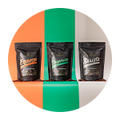What the heck is thermogenesis?
Coffee, as well as a slew of other ingredients like L-Carnitine, L-Tyrosine, Lean GBB, and Green Tea, have thermogenic inducing properties. Put simply, a thermogenic ingredient is one that boosts heat production in our bodies to burn additional energy in the form of calories. To explain this in more detail, we asked Dietitian Ryan Hasell from The Dojo to give us the low down on all the juicy science stuff 🤓
Thermogenesis
Caffeine (1,3,7-trimethylxanthine) is the most widely consumed psychostimulant in the world. It occurs naturally in the seeds, leaves, and fruits of over 60 different plants including coffee and guarana. Aside from helping us feel more awake and improving cognition, one of the major uses of caffeine is its effect on energy expenditure. The literature has shown quite conclusively that caffeine is associated with increased weight loss and suggests that one of the reasons is that caffeine acts as a stimulant for the nervous system, increasing something known as ‘sympathoadrenal system activation’ which can increase thermogenesis.
Thermogenesis is the process of producing heat inside the human body. Being warm-blooded creatures, thermogenesis processes are constantly going on within us. There are many ways in which the body can produce heat including through exercise, the thermic effect of food, and something called non-exercise activity thermogenesis (NEAT).
One of the mechanisms of heat production within our bodies is what’s known as non-shivering thermogenesis and happens within cells in our body known as brown adipose tissue or BAT. They are essentially fat cells but appear brown instead of yellow under a microscope because they are filled with mitochondria. These mitochondria are little fat-burning machines that normally convert fat into energy. However, within the BAT cells, these machines oxidise fat into heat.
The amount of fat these cells will convert into heat is largely regulated by thyroid hormone and the sympathetic nervous system which we now know can be upregulated through adrenalin or the intake of caffeine.
Within healthy adults, the thermogenetic benefits from caffeine have been shown even at regular doses of caffeine (around 100mg or one cup of coffee). In athletes, when caffeine is taken for performance, doses are commonly upwards of 400mg however for the average person 400mg is recommended as a good upper limit for day-to-day consumption to avoid any negative effects.
Guest written for Beforeyouspeak by Dietitian Ryan Hasell










